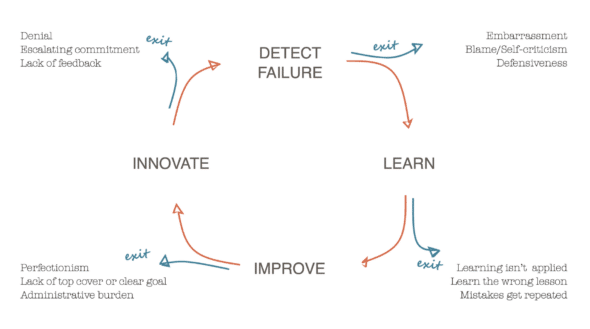Failure is inevitable, yet it so often feels shameful or embarrassing, no matter how experienced or inexperienced you are. If no one knows you made the mistake and you silently correct it, theoretically you won’t face the backlash of the error nor the discomfort of admitting the mistake. From here, this feeling of shame is motivation to not make that mistake again, and you’re all the safer knowing that no one knows you failed at something.
Regardless of how tempting and comfortable this approach may seem, it’s not an effective learning habit. This cycle of mistake, shame, and silent correction is neither the best way nor the most sustainable way to grow.
Why does this matter?
No matter where you are in life, you will experience failure. Simply put, to make mistakes is to be human. Obviously, we don’t intend to make mistakes but, because it is a reality, how we handle failure is important. Learning to fail well builds muscle memory and a certain fortitude, strengthening us so we’re not crushed by mistakes we make. Mistakes don’t have to be wasted on us if we don’t let them be.
This is where making intelligent mistakes comes into play.
The terms “intelligent failure” and “the strategy of small losses” was coined by Sim Sitkin a professor at Duke University, to reframe how we understand our mistakes. As he defines it, the main five markers of intelligent failures are:
- They are not done haphazardly but are hypothesis-driven.
- They are the result of endeavoring into new territory.
- They are small in scope.
- They are managed quickly, reducing time between event and its resolve.
- They are discoveries that inform other areas.
While not dismissing or endorsing mistakes, the term “intelligent failures” reframes failure by creating a structure for them and reaping the full benefit of learning from mistakes. Part of this structure is expecting that mistakes will happen (especially when learning something new) and knowing how to handle them when they do happen.
On a project team, uncertainties always have the potential to lead to mistakes. This understanding that mistakes happen guards against perfectionism, which is “the enemy of progress” as Winston Churchill said. When we’re prepared to make mistakes, we are ready to act when things do go wrong. In turn, that minimizes the time between the mistake and its resolution.
Know how to “fail well.”
While this may not be relevant to all fields, knowing how to fail well is incredibly important for software development teams. Mistakes of varying levels happen every day, and becoming more experienced in admitting mistakes and asking for help exponentially improves technical growth. Reported mistakes are the ones we learn the most from as opposed to silently resolved mistakes.
Amy Edmondson, a professor at Harvard Business School, says it this way: “When you insist on having error-free performances or error-free lives, the main thing that happens is not that error goes away; it’s that you stop hearing about.”
On the whole, mistakes are essential for advancing in new and old skills. They’re essential tools for skill advancement, revealing incorrect assumptions, and fostering a mindset where failures are seen as discoveries.
How can we facilitate”intelligent failures”?
One way to use this framework is to foster an environment where people feel safe to report errors and admit being wrong. These environments help people not fear failure and being wrong because they know everyone can make mistakes and that their mistakes won’t be held against them. Especially in software development, one must learn to make mistakes well and course-correct thoughtfully.
Mistakes are part of the everyday development process, so it makes a difference when people feel safe to work through mistakes openly. In the long run, the culture of fear and shame around mistakes affects the quality of the product, the trust between team members, and the ability of individuals to grow in new skills.
Another way of cultivating this type of environment is avoiding blame culture. On software projects, ideally several people will review any given code before it is merged in. So, although Git blame may point a finger at an individual who made a code error, the reality is that at least two people did not see the error before the merge. In complex systems, there usually isn’t a single origin of error. Rather, errors result from multiple people making a mistake because of the shared responsibility of a team.
Beyond being able to report mistakes, this open environment also enables individuals to reap the benefits of intelligent failures. The core of the “Fail Forward” program is the cycle of “detect failure, learn, improve, innovate.” This shows that mistakes propel innovation and growth. Deviations from this cycle can result in perfectionism to the point where no work gets done, blame culture when something inevitably goes wrong, and repeated mistakes when the first mistake is hidden in shame. Learning to make intelligent failures turns mistakes into discoveries and practice for resolving errors quickly.
Use Failure as a Data Point.
Learning how to make intelligent mistakes is an essential tool in organizational learning and growing new skills, and it starts with acknowledging that humans are limited in their ability to achieve perfection. The best way to leverage failure is to be ready for it, manage it quickly, and let it be another data point in the discovery process. To end on a cheesy note, Thomas Edison famously said when facing obstacles in inventing the incandescent lightbulb: “Failures? I haven’t failed. I’ve just found 10,000 ways that don’t work.”


